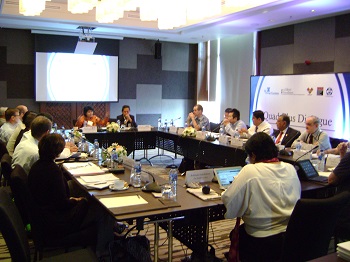

A VIF team led by its Director, General N. C. Vij, accompanied by Lt General Ravi Sawhney and Ambassador Sanjay Singh participated in the Quad-Plus dialogue held at Denpesar, Bali, Indonesia from February 1 to 3, 2015. Other participants were from the Heritage Foundation, USA, Tokyo Foundation (Japan), the Australian Strategic Policy Institute (ASPI), Australia, The Habibie Centre, Indonesia and the Albert Rosario Institute, Philippines. The discussion focused on "Regional Challenges to peace and Interstate Security", "Defence Cooperation: Operations and Industry" and "Counter Terrorism / Extremism Cooperation".
There was consensus that the Quad-Plus was an effective platform to discuss issues pertaining to the Indian Ocean and Asia- Pacific regions- the Indo-Pacific. In view of the strategic developments taking place in the region in general and the Quad-Plus countries in particular, with new leadership at the helm in India, Japan, Australia and Indonesia, the time had come for this grouping. The "Act East" initiative of the new Indian Government and its reaching out to the Quad Plus countries was underlined.
The rise of China was testing the existing balance in the creation of which the US had a large role. The values and norms promoted by the US such as free markets, liberal democracy, and rules of law were being challenged. China was utilising its growing hard and soft power to chip away at the existing structure and seek change in the rules governing both the economic and political architecture of the region. There was nevertheless also the opportunity to leverage efforts of Quad-Plus like-minded countries to integrate China into the current open, inclusive, and rule based structure respecting the freedom of global Commons and stress on dialogue and peaceful resolution of differences. It would be undesirable to follow a traditional balance of power approach through creation of alliances, which may not come about in any case. It was also recognised that the region faces growing non-traditional threats from terrorism, piracy, smuggling of narcotics, arms and people trafficking, pandemics and natural disasters.

It was recognised that the cooperation in the Defence sector, joint manufacturing, Research and development and exercising together provided a way to signal to an increasingly assertive China that the Quad-Plus countries were ready to stand together to defend their redlines in the maritime domain. Greater neutral awareness and cooperation would also help in meeting non-traditional threats. A presentation was made on India’s existing defense cooperation with the Quad-Plus countries and the opportunities that "Make in India" and the opening up of the Defence Industry Sector in India provided for enhancing cooperation.
The participants agreed that terrorism and activities of non-state actors posed a serious challenge to the region's countries. A briefing was made on the activities of Pakistan in providing support to terrorism directed against India. While terrorism could be a product of various factors including ethno- nationalism, the variety which took succour from religious extremism posed the greatest threat. The rise of IS posed grave danger of new form of terrorism linked with Islam, being communicated to S. E. Asia. There was growing danger from the takeover of mosques by extremists and their influence on young minds. ‘A one size fits all’ approach was not desirable. It was also imperative that there be greater counter terrorism and intelligence cooperation amongst Quad Plus countries. The utility of highlighting the Indonesian model of moderate Islam was underlined.
 There was agreement that Quad Plus countries should promote an open, inclusive, rule based regional architecture, which safeguards, peace and stability and promotes prosperity. It was essential to cooperate towards strengthening of democratic and like minded countries, which would help engendering check and balances and help in burden sharing. Networks’ should be created to protect sea-lanes of communications and fight against non-traditional threats especially of terrorism and piracy and also ensuring cyber security and cooperation against natural disasters. In this context, the structures being built under the aegis of the ASEAN and EAS hold considerable promise.
There was agreement that Quad Plus countries should promote an open, inclusive, rule based regional architecture, which safeguards, peace and stability and promotes prosperity. It was essential to cooperate towards strengthening of democratic and like minded countries, which would help engendering check and balances and help in burden sharing. Networks’ should be created to protect sea-lanes of communications and fight against non-traditional threats especially of terrorism and piracy and also ensuring cyber security and cooperation against natural disasters. In this context, the structures being built under the aegis of the ASEAN and EAS hold considerable promise.
In order to achieve this it would be useful to hold regular interactions at track II level which could be graduated to track 1.5 and track I levels. These could commence informally at the sides of multilateral events. These interactions should cover political, economic and security issues. There should be greater interactions between the security forces of Quad Plus countries especially their Navies. In addition, Defence Industry Cooperation both for manufacturing and in R & D and counter terrorism cooperation should be promoted. Other areas identified were those of economic and investment cooperation, cyber security, energy security, democracy, counters radicalism. It was agreed, that there should be greater interaction between think tanks of Quad Plus countries. In this manner, the Quad Plus countries can provide the foundation for Indo-Pacific Security. It was also decided that next dialogue would be held in India and coordinated by VIF.
Links:
[1] https://www.vifindia.org/node/2408
[2] http://www.facebook.com/sharer.php?title=Quad plus Dialogue&desc=&images=https://www.vifindia.org/sites/default/files/20150209-quad-plus-dialogue-bali.jpg&u=https://www.vifindia.org/
[3] http://twitter.com/share?text=Quad plus Dialogue&url=https://www.vifindia.org/&via=Azure Power
[4] whatsapp://send?text=https://www.vifindia.org/